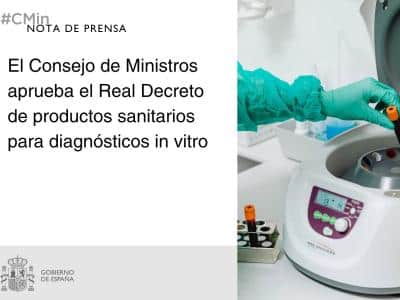In Madrid, on 21 October 2025, the Council of Ministers has given the green light to a new Royal Decree focused on the regulation of in vitro diagnostic medical devices. This regulation complements and clarifies provisions of Regulation (EU) 2017/746 that were at the disposal of the Member States, focusing its guidelines on protecting the health and safety of patients, in addition to promoting transparency and innovation within this key sector of the healthcare system.
The decree establishes a regulatory framework that applies to products intended for human use and their accessories, ranging from authorization procedures to requirements for functional studies, as well as conditions for marketing and control. The Spanish Agency of Medicines and Health Products (AEMPS) will be the authority responsible for implementing the regulation at the European level, in close collaboration with the autonomous communities.
Among the most notable novelties of the new decree are the regulation of in-house manufacturing in healthcare centers, which must be notified to the AEMPS in compliance with strict safety and quality requirements. Furthermore, individuals' explicit consent for genetic testing is required, with this authorization accompanied by detailed information about the implications of the test.
The decree also sets out the procedure to designate and operate European reference laboratories on Spanish territory, in addition to creating a mandatory national registry of commercialization for economic agents who wish to introduce products into the local market.
Regarding self-diagnostic products, such as pregnancy or glucose tests, it is clarified that they do not require a medical prescription, although their sale is limited to pharmacies and authorized digital channels. National requirements are also set for the authorization of functional studies, with an emphasis on coverage for damages to participants.
A reinforced system has been designed for market surveillance, inspection, and control, led by AEMPS together with regional health authorities. In addition, the decree regulates the foreign trade of these products, controlling imports and exports to ensure their traceability and regulatory compliance.
This new regulatory framework replaces Royal Decree 1662/2000, dated September 29, 2000, although some articles of the previous legal regime will remain in force temporarily until the new regulatory framework is fully implemented. The Ministry of Health shall have the power to issue the necessary supplementary provisions to facilitate technical adaptation.
As part of the implementation process, the AEMPS will organize an online information session on December 4, intended for professionals and industry stakeholders, to detail the changes and respond to concerns related to the transition to the new regulatory environment.
Fuente: Ministerio de Sanidad



